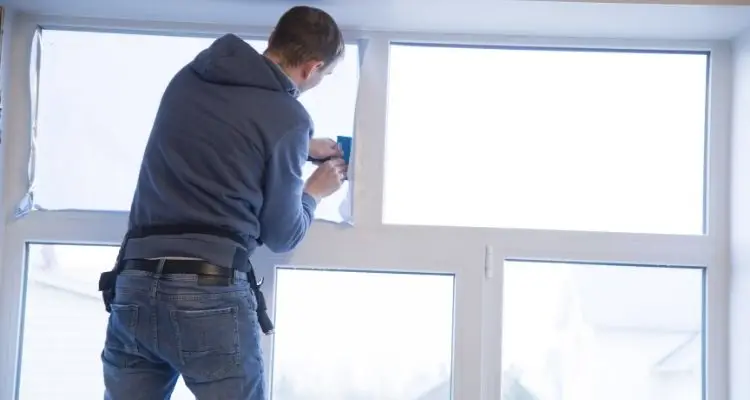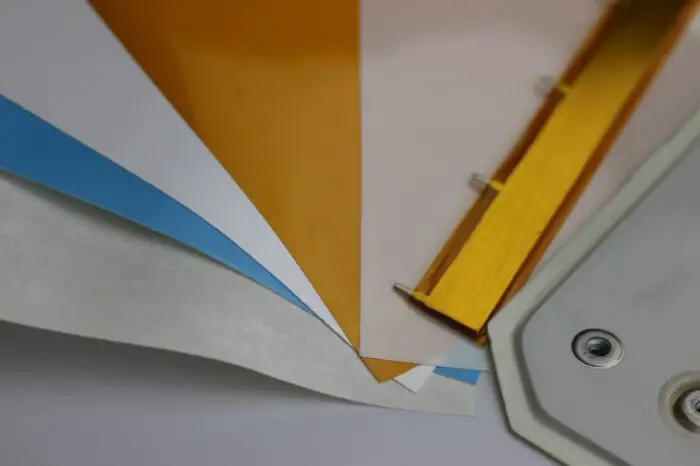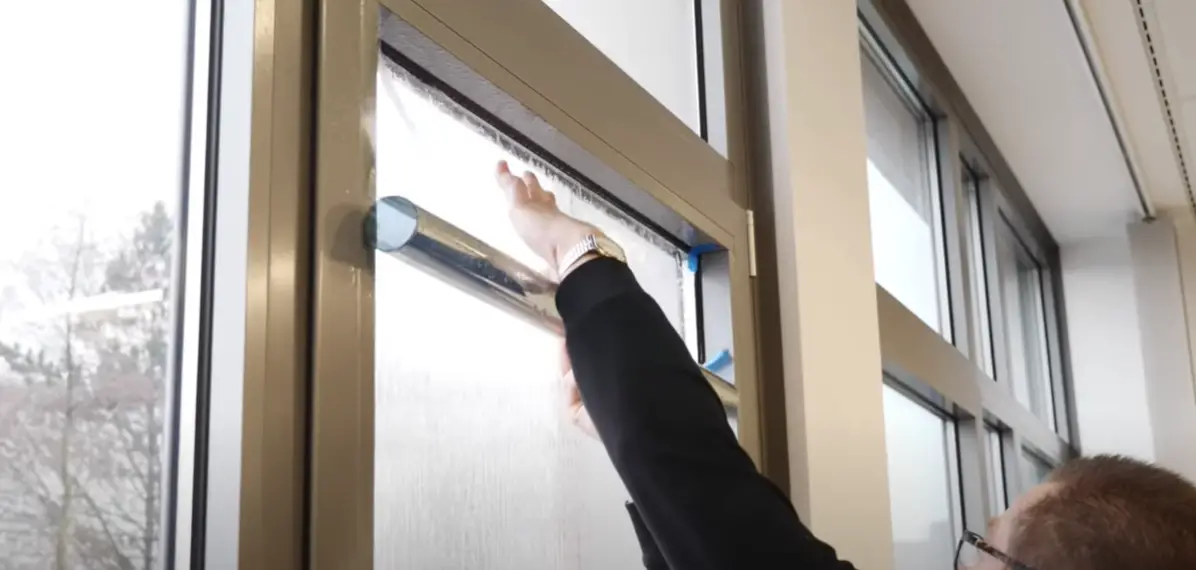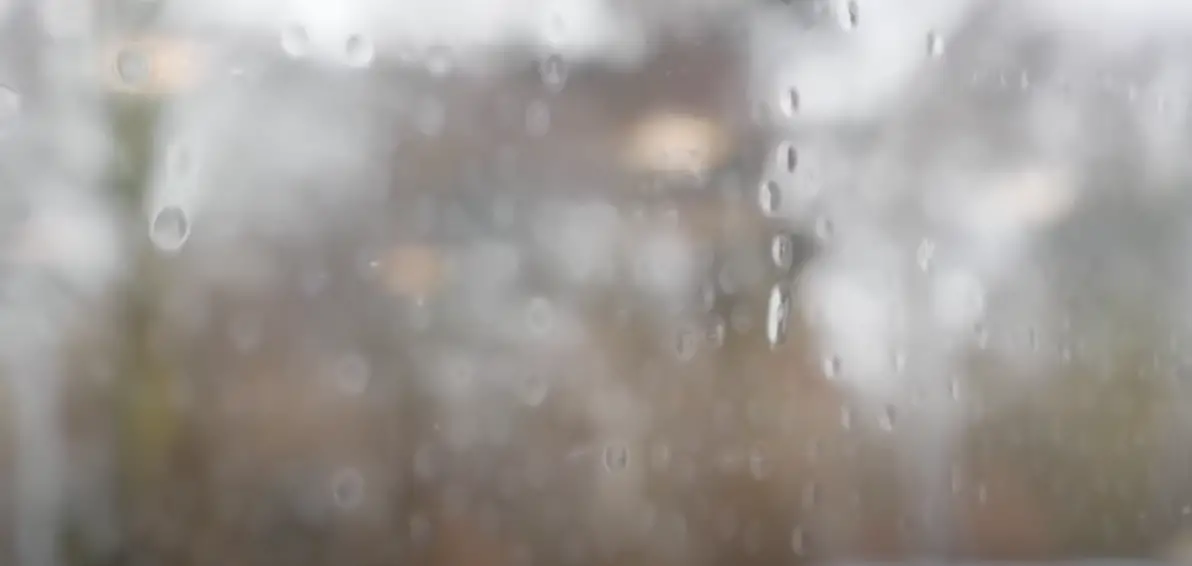There is a lot of debate surrounding window insulation film. Some people swear by it, while others think it’s a waste of time. So, does window insulation film really work? The answer is…it depends. Window insulation film can be a great way to save on energy costs, but it all depends on the type of film you use and your climate. In this blog post, we will discuss the pros and cons of window insulation film and help you decide if it’s right for you!
Why Should You Insulate Your Window?
The primary reason to insulate your windows is to keep heat in during the winter and out during the summer. This can save you money on your energy bills, as well as make your home more comfortable. [1]

What Is an Insulation Film?
An insulation film is a thin plastic sheet that is applied to the inside of a window. The film is held in place with double-sided tape or magnets, and creates an airtight seal.
Types of Insulation Film

Solar Control Film
This type of film is designed to reduce the amount of heat that comes into your home through the windows. It works by reflecting the sun’s rays away from the window, and it can also block UV rays.
Security Film
This type of film is designed to make your windows more shatter-resistant. It can help to hold glass together in the event of a break-in or severe weather.
Privacy Film
This type of film is designed to boost privacy in your home. It works by making it more difficult for people to see inside your home.
Convection Control Film
This type of film is designed to reduce heat loss through windows. It works by blocking the flow of heat from the inside of your home to the outside. [2]
Getting the Most from Your Window Film Insulation
Many people are looking for ways to reduce their energy costs, and one of the most popular methods is to add window film insulation. But does it really work? The answer may surprise you.

Window film insulation can be an effective way to reduce heat loss in your home, but it’s important to understand how it works and what its limitations are. Here are a few things to keep in mind when considering window film insulation:
- Window film works by creating a barrier between the interior of your home and the outside air.
- It’s important to choose a high-quality window film that will provide adequate protection against heat loss.
- Window film should be installed by a professional for best results.
- Window film is most effective when used in conjunction with other energy-saving measures, such as weatherstripping and caulking.
If you’re looking for ways to reduce your energy costs, window film insulation can be a great option. Keep these things in mind to get the most out of your investment.
Things to Consider When Buying Window Insulation Film
When it comes to window insulation film, there are a few things you’ll want to keep in mind before making your purchase. Here are a few things to consider:
- The type of window you have: There are different types of window insulation film available for different types of windows. Make sure you get the right type for your windows.
- The size of your window: You’ll need to measure your window before you buy the film so that you get the right size.
- The climate where you live: Some films work better in certain climates than others. If you live in an area with extreme temperatures, make sure the film you choose can handle it.
Once you’ve considered all of these factors, you’re ready to buy window insulation film and start saving money on your energy bills. [3]
Window Insulation Film Problems
Installing window insulation film may help you save money on your energy expenses, but there are a few potential issues to consider first.
First, window insulation film is not always easy to install. If you don’t do it correctly, the film can bubble and wrinkle, making it difficult to see out of your windows. Make sure you follow the instructions carefully and take your time when installing the film.
Second, window insulation film can reduce the amount of light that comes into your home. This might not be a problem during the daytime, but at night it can make your home feel dark and gloomy. If you want to let in more light, you can try using a clear version of the film.
Third, window insulation film can cause your windows to fog up. This is because the film traps moisture in between the glass and the film. If your windows fog up frequently, you might want to consider using a different type of window treatment.
Fourth, some people are concerned about toxins in window insulation films. While most brands are safe, there are some that contain chemicals that can be harmful if they’re inhaled. If you’re concerned about toxins, look for brands that are certified by the Environmental Protection Agency (EPA).
Finally, window insulation film is not a permanent solution. It will eventually degrade and need to be replaced. If you want a more permanent solution, you might want to consider replacing your windows altogether. [4]
Moisture Issues on Your Windows

If you have moisture issues on your windows, then window insulation film may not be the best solution. The film can actually trap moisture and cause condensation, which can lead to mold and mildew growth. If you have concerns about moisture on your windows, consult a professional before installing any type of insulation film.
Do-It-Yourself Installation Can Be Tricky
If you’re thinking about installing window insulation film yourself, be aware that it can be tricky. The film must be cut to size and then applied to the window surface with an adhesive. If you don’t do it right, the film can bubble or peel, and you’ll just end up wasting your time and money.
Affordable Alternatives to Window Insulation Film
If you’re looking for an affordable way to insulate your windows, there are a few alternatives to window insulation film. You can try weatherstripping or caulking around the edges of your windows, or you can install insulated window panels. These options will provide some insulation without the hassle of installing window film.
Before you decide to install window insulation film, it’s important to weigh the pros and cons. Consider your needs and consult with a professional before making a final decision. With a little research, you can find the best solution for insulating your windows.window insulation film is not always the best solution for moisture issues on your windows as it may lead to condensation which could then cause mold or mildew growth. [5]
Is Window Insulation Film Worth It?
You’ve seen the commercials: a clear plastic film is applied to window glass, and voila! Your energy bills are slashed. But does this product really work?

The answer is…maybe. Window insulation film can help reduce heat loss in your home, but it’s not a miracle cure for high energy bills. Here’s what you need to know about how window insulation film works, and whether or not it’s right for your home.
Window insulation film is made of clear plastic, typically polyethylene or polypropylene. The film is applied to the inside surface of your window glass with double-sided tape or adhesive strips. Once in place, the film creates an additional barrier between the indoor and outdoor air temperatures.
Window insulation film is most effective when applied to single-pane glass or drafty windows. It can also help insulate older windows that have cracks or gaps around the frames. If your windows are in good condition and you have double- or triple-pane glass, window film may not make much of a difference.
FAQ
Does covering windows with plastic really help?
The short answer is yes, but it depends on a few factors. Let’s take a closer look.
How does window insulation film work?
Window insulation film works by creating an insulating barrier between the indoor and outdoor surfaces of your windows. This barrier helps to keep heat in during the winter and out during the summer. In order to be effective, window insulation film must be applied properly. Once applied, the film should be smooth and free of bubbles or wrinkles. If there are any gaps or holes in the film, it will not work as well.
What are some of the benefits of using window insulation film?
There are several benefits to using window insulation film, including:
- Reduced energy costs: By insulating your windows, you can reduce your heating and cooling costs.
- Increased comfort: Window insulation film helps to keep your home more comfortable by regulating the temperature.
- Protection from UV rays: Window insulation film can also help to protect your furniture and flooring from fading due to UV exposure.
- Noise reduction: In addition to insulating against temperature, window insulation film can also help to reduce noise pollution.
Is window insulation film easy to apply?
Window insulation film is generally very easy to apply. Most films come with an adhesive backing that makes it simple to attach the film to your windows. Some films require the use of a hair dryer or other heat source in order to shrink the film and eliminate bubbles. Once applied, the film should be smooth and free of bubbles or wrinkles.
How long does window insulation film last?
Window insulation film can last for several years if it is applied properly and taken care of. To extend the life of your window insulation film, avoid washing it with harsh chemicals or scrubbing it with abrasive materials. If the film starts to peel or bubble, you can usually reapply it using a hair dryer or other heat source.
What are some of the drawbacks of using window insulation film?
While there are many benefits to using window insulation film, there are also some drawbacks to consider:
- Obstructed view: One downside to window insulation film is that it can obstruct your view. This is especially true for darker films.
- Difficulty removing: Window insulation film can be difficult to remove, especially if it has been on your windows for a long time. If you do need to remove the film, it is best to use a heat gun or hair dryer to soften the adhesive before peeling it off.
- Harmful chemicals: Some window insulation films contain harmful chemicals, such as PVCs, that can off-gas over time. These chemicals can be damaging to your health and the environment. Look for window insulation films that are made from safer materials, such as polyethylene or polyester.
Despite some of the drawbacks, window insulation film can be a great way to reduce energy costs and increase comfort in your home.
Do window films keep cold out?
Window films are designed to reflect heat away from your windows in the summer, and keep heat inside your home in the winter. So, if you live in a cold climate, window film can help reduce your heating costs. Window film is not as effective as double-pane or triple-pane windows at insulating your home. But it can still make a difference, particularly if you have single-pane windows. In fact, some estimates suggest that window film can improve the insulation of single-pane windows by up to 50%. If you’re considering window film for your home, make sure to choose a product that has been certified by the International Window Film Association. Window film can also help reduce glare and protect your furniture from fading. And it can do all this without blocking your view. So, if you’re looking for a way to improve the energy efficiency of your home, window film is definitely worth considering. Just keep in mind that it’s not a miracle solution, and it won’t work as well as double- or triple-paned windows.
How much does window insulation film help?
Window insulation film is designed to minimize heat loss through windows. By keeping the warm air inside your home, it reduces your heating costs in the winter. But how effective is window insulation film? There are a few factors that affect how well window insulation film works:
- The type of window
- The climate you live in
- How well the film is installed
In general, window insulation film can save you around seven to twelve percent on your heating bill. That’s not a huge amount, but every little bit helps! And if you live in a particularly cold climate or have drafty windows, window insulation film can make a big difference.
Is 3M window film worth it?
The short answer is yes, window film can definitely help reduce your energy bills. In fact, the U.S. Department of Energy estimates that window film can save you up to 30% on your heating and cooling costs. Window insulation film works by creating a barrier between the inside and outside of your windows. This barrier helps to keep heat in during the winter and out during the summer. And because it’s clear, it won’t change the look of your windows at all!
If you’re interested in saving money on your energy bills, we highly recommend giving window insulation film a try. It’s an easy and affordable way to make your home more energy-efficient.
Can I install 3M window film myself?
Yes, you can install window film yourself. However, we recommend that you have someone else do it for you to avoid any potential problems. If you decide to do it yourself, make sure that you follow the instructions carefully and take your time. It’s also a good idea to practice on a smaller window first before doing the entire project. Once you’ve installed the film, check it regularly to make sure that it’s still working properly. If you notice any bubbles or wrinkles, simply reapply the film according to the manufacturer’s instructions.
Overall, installing window film is a relatively easy project that can save you money on your energy bills. Just be sure to do your research and follow the instructions carefully!
Useful Video: How to install 3M Thinsulate Window Film
Conclusion
Overall, window insulation film can be a helpful way to improve your home’s energy efficiency. It is important to do your research and purchase a quality product, however, as some products on the market may not live up to their claims. If you are patient and take the time to install the film correctly, you can enjoy the benefits of lower energy bills and a more comfortable home.
Have you ever used window insulation film? What was your experience? Share your tips in the comments below! And, as always, if you have any questions about this or any other home improvement project, our team is here to help. Give us a call today!
We hope you found this blog post helpful. We are always happy to help! Thanks for reading!
References
- https://www.move.org/5-ways-insulate-apartment-windows-winter/
- https://www.bobvila.com/articles/best-window-insulation-kit/
- https://premiertint.com.au/2020/05/13/5-features-to-look-out-for-when-buying-window-film-for-your-home/
- https://blog.thermawood.com.au/window-insulation-film
- https://www.hometips.com/buying-guides/energy-weatherstripping-caulking.html














Leave a Reply